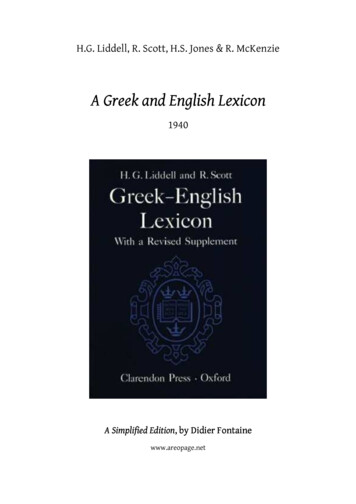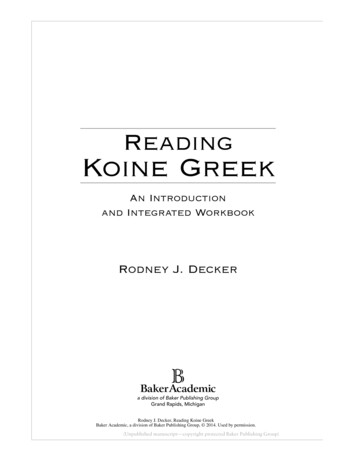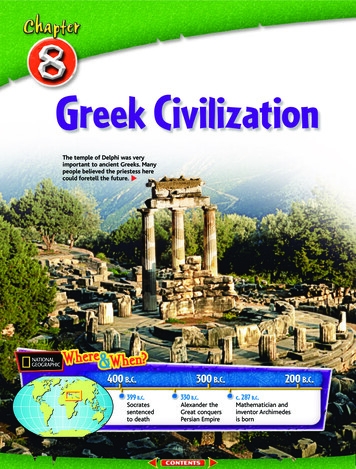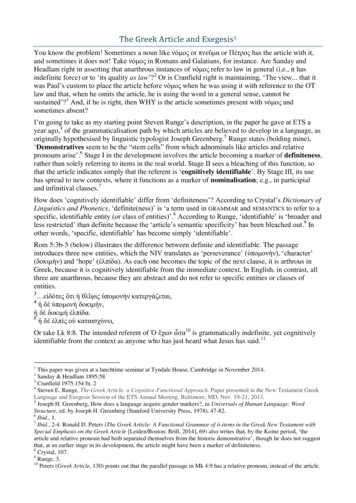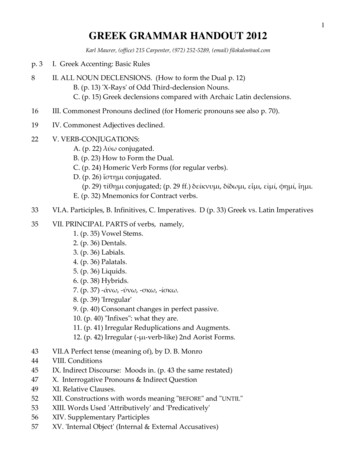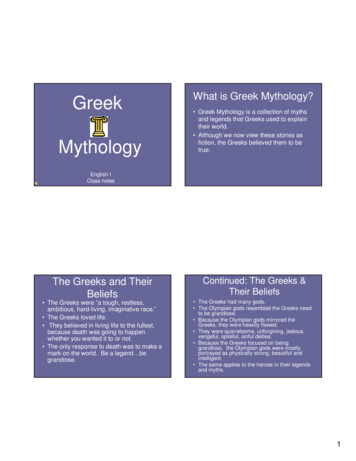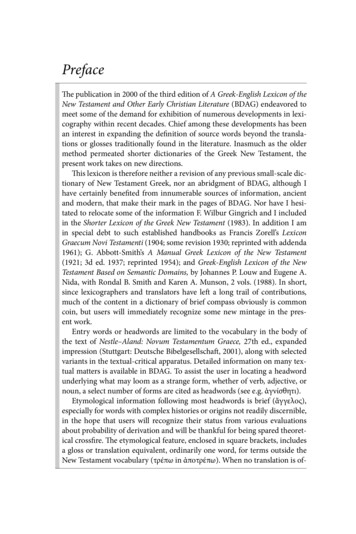
Transcription
PrefaceThe publication in 2000 of the third edition of A Greek-English Lexicon of theNew Testament and Other Early Christian Literature (BDAG) endeavored tomeet some of the demand for exhibition of numerous developments in lexicography within recent decades. Chief among these developments has beenan interest in expanding the definition of source words beyond the translations or glosses traditionally found in the literature. Inasmuch as the oldermethod permeated shorter dictionaries of the Greek New Testament, thepresent work takes on new directions.This lexicon is therefore neither a revision of any previous small-scale dictionary of New Testament Greek, nor an abridgment of BDAG, although Ihave certainly benefited from innumerable sources of information, ancientand modern, that make their mark in the pages of BDAG. Nor have I hesitated to relocate some of the information F. Wilbur Gingrich and I includedin the Shorter Lexicon of the Greek New Testament (1983). In addition I amin special debt to such established handbooks as Francis Zorell’s LexiconGraecum Novi Testamenti (1904; some revision 1930; reprinted with addenda1961); G. Abbott-Smith’s A Manual Greek Lexicon of the New Testament(1921; 3d ed. 1937; reprinted 1954); and Greek-English Lexicon of the NewTestament Based on Semantic Domains, by Johannes P. Louw and Eugene A.Nida, with Rondal B. Smith and Karen A. Munson, 2 vols. (1988). In short,since lexicographers and translators have left a long trail of contributions,much of the content in a dictionary of brief compass obviously is commoncoin, but users will immediately recognize some new mintage in the present work.Entry words or headwords are limited to the vocabulary in the body ofthe text of Nestle–Aland: Novum Testamentum Graece, 27th ed., expandedimpression (Stuttgart: Deutsche Bibelgesellschaft, 2001), along with selectedvariants in the textual-critical apparatus. Detailed information on many textual matters is available in BDAG. To assist the user in locating a headwordunderlying what may loom as a strange form, whether of verb, adjective, ornoun, a select number of forms are cited as headwords (see e.g. ἁγνίσθητι).Etymological information following most headwords is brief (ἄγγελος),especially for words with complex histories or origins not readily discernible,in the hope that users will recognize their status from various evaluationsabout probability of derivation and will be thankful for being spared theoretical crossfire. The etymological feature, enclosed in square brackets, includesa gloss or translation equivalent, ordinarily one word, for terms outside theNew Testament vocabulary (τρέπω in ἀποτρέπω). When no translation is of-
p r e fa c efered, users can conclude that a headword (γαμίζω) is from a base (γάμος)appearing in the present volume as a headword and with further etymological detail. Frequently a semicolon concludes the etymological data andis followed by semantic background in non-biblical sources ). This latter procedure is exhibited especially in connectionwith terms that are used only in an extended or imagistic sense in the NT(ἀβαρής). The idea is to help the user recognize the broader linguistic context for New Testament usage of words.The definition section of the entry follows the etymological observations. Many sections consist of one (ἄβυσσος) or more (ἀγαθοποιέω) majormeaning units or semantic classifications introduced by a defining phrase orstatement of meaning in light font within single quotation marks. I call thisfeature “extended definition.” The Concise Lexicon (CL) may seem to defy itsown title through inclusion of such an extended definition for many entries.But as explained below, this important feature enables the user to understandthe formal equivalents or glosses in terms of the actual definition.Sometimes an extended definition is not necessary, and the initial glossitself (in bold italics) serves as the meaning (as in ἀγοράζω). When morethan one major classification or meaning unit is required, each is numberedwith an arabic numeral (ἀγάπη). In related manner any subset of these isnoted with an alphabetical letter (ἄγγελος). If further divisions are required,they are marked with Greek letters (ἀπόλλυμι). Since formal equivalents frequently have a semantic life of their own, the extended definition providesa more precise idea of the meaning of the headword and outlines the frameof reference within which the formal equivalents or glosses are to be understood. Thus CL tries to avoid some English semantic overload. In addition,CL frequently offers suggestions, as either differentiating information ora lightface gloss or both, for rendering a Greek word in a specific passage(ἀδικέω, αἷμα, αἴρω), and with frequent focus on a phrase. The variationsexhibited do not indicate different meanings, but reflect the fact that English has numerous devices, including circumlocution and idiomatic transference, for rendering a Greek word that depends on context for its specificsense (βλέπω). On occasion, a gloss contained in one classification may berepeated in another classification but with a different sense simply because ofthe flexibility of the English language (ἀδικία). Hence the importance of theextended definition for erasure of ambiguity.Biblical references follow glosses, which are chosen to accord with Englishidiom for conveying nuances in the Greek text (ἀνάγω). Special phrases inthe Greek text may be included and rendered in italics (ἀγανακτέω, κολλάω).Depending on the nature of the data, various ways of indicating meaning areincorporated in flexible adaptation of the procedures described above. Theaccompanying diagram briefly illustrates the principal lines of what is described in the preceding narrative.vi
p r e fa c eFor many glosses and translation of phrases I encourage users, shouldthey be inclined, to formulate an alternative rendering while keeping the extended definition in mind as the governing semantic agent. Thus the usertakes part in the lexical enterprise and the corresponding challenge for acceptable translation.This dictionary builds on the principle that a source language is not to becontorted by demands of English grammatical and idiomatic considerations.Hence I take a minimalist approach to classification of meaning or definition. Writers in English have a far vaster repertoire of lexemes and dictionary words at their disposal than do writers in Greek. The latter move out ofapparent linguistic poverty into a wealth of dexterous use of compounds andsyntactical devices. Such creative enterprise leads to some embarrassment forEnglish translators, who find themselves unwittingly engaged in redundancybecause of the very wealth of English words with special senses for which aGreek writer resorts to context and grammatical maneuvers to express thevii
p r e fa c esame idea. Users of this dictionary furthermore ought not be surprised whenencountering an English neologism used to render some Greek expressionfor which no specific form exists in standard English usage. Basic principle:the Greek language does not exist for the convenience of translators, buthas the genius of challenging receptors of the language to avoid distortion.Having accepted the challenge, I must confess that the task is daunting, andwhere apology for offending such a beautiful language as Greek in any formis in order I shall mount no defense. But for my attempt to advance the causeof New Testament lexicography in the service of the Greek language and theGreat Word proclaimed through it I have no regrets.I cannot adequately express how much the sage counsel of Kathryn Krughas contributed to the value of this book and the pleasure I have had in preparing it. To Prof. David Warren I am especially indebted for the judiciouscare he expended on this work. For anything in need of correction I acceptfull responsibility. To Prof. Dr. Rykle Borger and Prof. James Voelz I remaingrateful for their encouragement. Appreciation is due also to Ms. Irene Tsukakis, a Grecian who alerted me to linguistic and socio-cultural aspects notreadily found in academic treatises. My thanks to all on the staff of the University of Chicago Press for their contributions, especially to the welfare ofmy computer. And space and time would fail me to express my gratitude forLois, my wife and companion for sixty years (†August 6, 2008), who profoundly bridged matters of mind and spirit and helped clear the way for thislexicon to its final manuscript page.Frederick William DankerSt. Louis, Missouriviii
ΑA, α, τό first letter of the Greek alphabet, alpha, αʹ as numeral one or first, intitles of 1 Cor etc. See also ἄλφα.Ἀαρών, ὁ [Heb.] indecl. Aaron, brother of Miriam and Moses (Exodus 4:14) Lk1:5; Ac 7:40; Hb 5:4; 7:11; 9:4.Ἀβαδδών, ὁ [Heb. ‘destruction’] indecl. Abaddon. Gk. Ἀπολλύων Destroyer, theruling angel in Hades Rv 9:11.ἀβαρής, ές, gen. οῦς [ἀ- priv., βάρος; ‘not heavy’] unburdensome ἀβαρῆ ἐμαυτόνἐτήρησα I was on my guard not to be a burden to you 2 Cor 11:9.ἀββά [Aram.] voc., transl. abba (O) father, in our lit. used as address to God inprayer, as ὁ πατήρ: Mk 14:36; Ro 8:15; Gal 4:6.Ἅβελ, ὁ [Heb., of uncertain etymology] some edd. Ἄβελ, indecl. Abel, the secondson of Adam and Eve (Genesis 4:2–10) Mt 23:35; Lk 11:51; Hb 11:4; 12:24.Ἀβιά, ὁ [Heb.] indecl. Abijah—1. son of Rehoboam (1 Chronicles 3:10), in genealogy of Mt 1:7.—2. founder of a class of priests (1 Chronicles 24:10) to whichZacharias belonged Lk 1:5.Ἀβιαϑάρ, ὁ [Heb.] indecl. Abiathar, priest at Nob, son of Ahimelech (1 Samuel22:20ff ) Mk 2:26.Ἀβιληνή, ῆς, ἡ [orig. uncertain] Abilene, the region around the city of Abila,northwest of Damascus, between Damascus and Heliopolis Lk 3:1.Ἀβιούδ, ὁ [Heb.] indecl. Abiud, ancestor of Jesus Mt 1:13.Ἀβραάμ, ὁ [Heb. ‘father of a multitude’] indecl. Abraham, husband of Sarah andcohabitant with Hagar, father of Isaac (by Sarah) and Ishmael (by Hagar) and ancestor of many people groups (Genesis 16–17, with focus on Isaac); in NT in anextended sense as ancestor of the followers of Jesus Christ Ro 4:1–25 and oft.ἄβυσσος, ου, ἡ [ἀ- priv., βυσσός βυϑός ‘depth’ esp. of the sea; ‘something ofsuch depth that it appears beyond standard measurement’] ‘a transcendent regiondeep below the earth’s surface’, abyss, underworld, of the deep abode of the deadRo 10:7; of demons Lk 8:31; of an apocalyptic beast Rv 11:7.Ἅγαβος, ου, ὁ [Heb.] Agabus, a Christian prophet from Judea Ac 11:28; 21:10.ἀγαγεῖν, ἀγάγετε, ἀγαγών 2d aor. act. inf., impv., and ptc. of ἄγω.ἀγαϑοεργέω [ἀγοϑοεργός] also as contracted form ἀγαϑουργέω ‘do what is goodand in a way that is beneficial to another’, render service, confer benefits Ac 14:17;1 Ti 6:18.ἀγαϑοεργός, όν [ἀγαϑός, ἔργον] ‘doing good in a way that benefits another’, conferring benefits, doing good, as noun one who confers benefits / does good, practically equivalent to being a good citizen Ro 13:3 v.l.ἀγαϑοποιέω [ἀγαϑοποιός]—1. ‘do someth. that is good or helpful’, do good (to),confer a benefit (on) Lk 6:9 (abs.), 33 (w. acc.).—2. ‘do that which contributes tothe welfare of society or the state’, do the right (thing) 1 Pt 2:15, 20.1
ἀγαϑοποιΐα, ας, ἡ ἀγάπη, ης, ἡἀγαϑοποιΐα, ας, ἡ [ἀγαϑοποιός] doing what is good/right/helpful, with specialref. to one’s responsibilities as a member of society 1 Pt 4:19.ἀγαϑοποιός, όν [ἀγαϑός, ποιέω] opp. ϰαϰοποιός: ‘pert. to doing what is good,right, or helpful’, as noun one who does someth. good/praiseworthy, of a publicspirited or socially conscious citizen 1 Pt 2:14.ἀγαϑός, ή, όν [orig. unclear] ‘pert. to achieving a high standard of excellence inmeeting a need or interest’, beneficial, useful, helpful, good—a. of pers.: God asthe ultimate measure of goodness Mk 10:18b; Christ 10:18a.—b. of things, animate or inanimate: gifts wholesome, good Mt 7:11; ground, earth fertile Lk 8:8;vegetation healthy Mt 7:17f; worthwhile activity, good, beneficial works Ac 9:36;words helpful Eph 4:29; day-to-day living enjoyable 1 Pt 3:10; conscience clear,clean Ac 23:1 al.; faith strong, resolute, steadfast Tit 2:10; personal dispositionkind 1 Pt 2:18; expectation loaded with promise of benefits 2 Th 2:16; in imageryof food, Mary chose the good course a portion loaded with benefits Lk 10:42.Nt. used as noun, that which is good, in a civic or social sense Ro 2:10; cp. J 5:29;of circumstances that turn out to someone’s best interest Ro 8:28; pl., of assetsgoods Lk 16:25.ἀγαϑουργέω s. ἀγαϑοεργέω.ἀγαϑωσύνη, ης, ἡ [ἀγαϑός] ‘quality or characteristic of being concerned aboutthe well-being of others’, goodness Ro 15:14; Gal 5:22; Eph 5:9; 2 Th 1:11.ἀγαλλίασις, εως, ἡ [ἀγαλλιάω; only in biblical usage] ‘exuberant joy’, rejoicingLk 1:44; Ac 2:46; in imagery of oil used at a festival ἔλαιον ἀγαλλιάσεως oil ofjoy/celebration Hb 1:9.ἀγαλλιάω [later form of ἀγάλλομαι in same sense] ‘be exuberantly joyful’, rejoice,exult, act. Lk 1:47; Rv 19:7; mid. with qualifying dat. 1 Pt 1:8; the joy of Jesusexpressed in close association with the Holy Spirit Lk 10:21; pass. with act. senseand prepositional qualifier ἠϑελήσατε ἀγαλλιαϑῆναι ἐν τῷ φωτὶ αὐτοῦ you werewilling to rejoice in his light J 5:35.ἄγαμος, ου, ὁ/ἡ [ἀ- priv., γάμος] ‘pert. to being without a spouse’, unmarried,either a man or a woman 1 Cor 7:8; of a man 7:32; of a woman 7:11, 34.ἀγαναϰτέω [etym. unclear]—1. inward aspect ‘be upset about someth. that violates one’s sense of propriety’, be vexed, be distressed, be annoyed, Mt 20:24;21:15; Mk 10:14; Lk 13:14.—2. verbal aspect ‘express indignation’, Mk 14:4ἀ. πρὸς ἑαυτούς, vehemently shared their displeasure.ἀγανάϰτησις, εως, ἡ [s. prec.] ‘a state of vexation’, indignation, of anger arousedby a sense of wrong 2 Cor 7:11.ἀγαπάω [etym. uncertain]—1. of personal relationships, ‘have such an interest inanother that one wishes to contribute to the other’s well-being’, have concern for,hold in esteem, love, of God’s affection for humanity J 3:16; Ro 8:37; hence in Jesus’ directive to his followers concerning enemies Mt 5:44. Of Jesus’ regard for aninterlocutor Mk 10:21; similarly for the congregation and as model for husbandsEph 5:25. Of Paul’s concern for the Corinthians 2 Cor 12:15. In J 21:15f the useof ἀ. implies an interest in others that does not approach the intimacy suggestedby φιλία (friendship).—2. ‘take delight in’, value, esteem, of recognition by othersLk 11:43; J 12:43.ἀγάπη, ης, ἡ [ἀγαπάω]—1. ‘a relatively high level of interest in the well-being ofanother’, affection, esteem, love, of God’s self as definition of ἀ., i.e. think of God2
ἀγαπητός, ή, όν ἅγιος, α, ονand you think of ἀ. 1 J 4:8, 16; of God in outreach to people through the Son Ro5:8; God and Christ in reciprocity to one another J 15:10; 17:26; of pers.: to God5:42; to another human 2 Cor 8:7; as a superior quality Ro 13:10; 1 Cor 8:1;13:1–3.—2. ‘a feast at which common interests are shared’, love feast of a Christian group Jd 12; 2 Pt 2:13 v.l.ἀγαπητός, ή, όν [ἀγαπάω] ‘held in affection’, esteemed, dear, of people by GodRo 1:4; 11:28; believers in various degrees of relationship 1 Cor 4:17; 3 J 2, 5, 11;Phlm 16; pl. 1 Cor 15:58; Js 1:16 al. Jesus esp. chosen by God Mt 3:17.Ἁγάρ, ἡ [Heb.] indecl. Hagar, Sarah’s slave, loaned to Abraham as a concubine(Genesis 16), mother of Ishmael, in imagery of the Mosaic code Gal 4:24f.ἀγγαρεύω [cp. ἄγγαρος ‘mounted courier’ in Persia] ‘compel or force to dosometh.’, with military nuance associated with the Lat. angario press into service: commandeer, requisition Mt 27:32; Mk 15:21; prob. also Mt 5:41.ἀγγεῖον, ου, τό [ἄγγος ‘vessel’] ‘a container for goods’, with type varying according to commodity, vessel, container for fish Mt 13:48 v.l.; flask for oil 25:4.ἀγγελία, ας, ἡ [ἄγγελος] ‘a message delivered from outside the receiving public’(contrast the verb ἐξαγγέλλω) with nuance of importance, of good news as announcement 1 J 1:5; as proclamation, tantamount to directive 3:11.ἀγγέλλω [ἄγγελος] ‘serve as messenger’, announce, report J 20:18; 4:51 v.l.ἄγγελος, ου, ὁ [Skt. assoc., cp. ἀγγαρεύω] ‘one who acts as an agent/courier intransmitting a message or announcement’, messenger, envoy, attendant—a. ofhumans: John the Baptizer Mt 11:10; John’s agents Lk 7:24; ἀ. spy Js 2:25.—b.traditionally rendered angel in reference to transcendent beings: in general Mt22:30; Ro 8:38; 1 Cor 6:3. Specifically of attendants at the service of God Mt24:36; Lk 12:8; of God’s envoy Mt 1:20; as heaven-sent aide or guardian Ac 12:15;cp. Mt 18:10; as mediator Gal 3:19. Also of Satan’s envoy 2 Cor 12:7; cp. the general reference to the Slanderer’s retinue Mt 25:41.ἄγγος, ους, τό [cp. ἀγϰών ‘bend of the arm’, hence apparently the idea of an embracing medium; cp. our ‘hold’ in ref. to a container] ‘a container primarily usedfor wet items’, vessel, container for fish Mt 13:48.ἄγε pres. impv. of ἄγω; functions as interjection in address to one or more pers.come! Js 4:13; 5:1.ἀγέλη, ης, ἡ [ἄγω; any ‘herd’ or ‘company’] herd of swine Mt 8:30–32 and only inparallel Gospel passages.ἀγενεαλόγητος, ον [ἀ- priv., γενεαλογέω] ‘lacking in genealogical history’, without genealogy Hb 7:3.ἀγενής, ές, gen. οῦς [ἀ- priv., γένος; ‘not of noble birth’] ‘without recognized social status’, lowborn, insignificant, of no account 1 Cor 1:28.ἁγιάζω [ἅγιος] ‘set apart into the realm of the sacred’, in our lit. with focus onelimination of that which jeopardizes access to God. Of things purify Mt 23:17,19; 1 Ti 4:5; of pers. purify, set apart, dedicate J 10:36; 1 Cor 7:14; Hb 9:13; ofChrist given priority in one’s inner life 1 Pt 3:15; of all beneficiaries of divine inheritance Ac 20:32; of God’s name revere Mt 6:9; Lk 11:2.ἁγιασμός, οῦ, ὁ [ἁγιάζω] ‘dedication to the interests of deity’, holiness, consecration Ro 6:19; 22; 1 Ti 2:15; specifically of God’s achievement in believers throughJesus Christ 1 Cor 1:30.ἅγιος, α, ον [Skt. assoc.] ‘set apart for dedication to the interests or expectations3
1961); G. Abbott-Smith's A Manual Greek Lexicon of the New Testament (1921; 3d ed. 1937; reprinted 1954); and Greek-English Lexicon of the New Testament Based on Semantic Domains, by Johannes P. Louw and Eugene A. Nida, with Rondal B. Smith and Karen A. Munson, 2 vols. (1988). In short, since lexicographers and translators have left a long .


